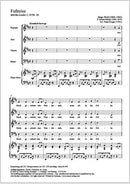| 作曲者 | Hugo Wolf (1860-1903)・フーゴ・ヴォルフ |
| タイトル | Fußreise |
| 出版社 | Carus・カールス |
| 楽器編成 | 混声合唱 |
| 楽器編成(詳細) | Coro SATB,Piano |
| 品番 | M007249182 |
| 編曲者 | Denis Rouger |
| 難易度 | 中級 |
| 言語 | ドイツ語 |
| 形状 | 8 ページ・21 x 29.7 cm・24 g・表紙カバー無し |
| 演奏時間 | 3分 |
| 出版年 | 2020年 |
| 出版番号 | CV 09.256/00 |
| ISMN | 979-0-007-24918-2 |
| サンプル | https://www.carusmedia.com/images-intern/medien/00/0925600/0925600x.pdf |
Hugo Wolf set a total of 53 songs by Eduard Mörike, all in the year 1888. The composer wrote in a letter: "Once you have heard this song, it can only inspire one wish – to die." In the artistic-metaphysical milieu of the late 19th century this was regarded as the highest ideal, especially for Hugo Wolf, who believed in the body as a “wretched piano case” from which the soul can only break free like harmonies dying away. And yet "Fußreise" (Journey on Foot) begins as a simple, happy, elated song of travel, revolving around the key of D major over an ostinato piano rhythm. "Old Adam" believes he senses the "bliss of paradise" in this, but he continues to be caught in the tension between earthly suffering and eternal longing, as the rest of Hugo Wolf's setting clearly shows: it remains a pious hope that a whole life "would be such a morning journey bathed in gentle perspiration". These art songs were originally composed not for chamber choir, but for solo voice and piano. Denis Rouger has carefully adapted them to suit the requirements and expressive possibilities offered by a larger ensemble, without losing the any of the qualities of the original in the process. Each part in the choir has a melodic line drawn from the harmonic and rhythmic framework. In the process, the variety and refinement of the choral language combines with an enormous flexibility in form and expression, as French melodies or German art song demand from a soloist and pianist. The songs have been recorded by the figure humaine chamber choir on the CD "Kennst du das Land ..." (Carus 83.495).



